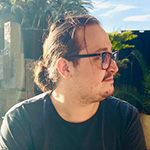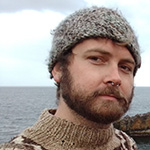The word city
The word city
hides
an animal dust
A city is always
biological
A city is born shits eats
agonizes
knows itself as fleshless bone
and tomb of all of the dead
In the word city
there’s no real sign
The word city
is always an extinct map
an outline of what it should be
The word city erects itself
as a vertebral monument
born of the same blood as the living
a city like an immense jungle
a house
like a nest
like a honeycomb
about to be burned
La palabra ciudad
La palabra ciudad
esconde un polvo
inherente a lo animal
Una ciudad es siempre
biológica
Una ciudad nace caga come
agoniza
se sabe hueso pulcro
y sepulcro de todos los muertos
La palabra ciudad
adolece de un signo real
La palabra ciudad
es siempre un mapa extinto
un calco de lo que debía ser
La palabra ciudad se erige
como un monumento vertebrado
nacido de la propia sangre de lo vivo
una ciudad como una inmensa selva
una casa
como un nido
como un panal
a punto de ser quemado
I already recognize myself
I already recognize myself
in the streets of Santiago
in the overwhelmingly contradictory nature
of its blood,
certainly in its rebellion
and its graffitied walls,
in the unforgivable speed
of its busses,
in its ransacked
or burned-down corners,
in its icy mornings
and merkén.
I believe in Santiago
like I believe in myself,
beast born
of indignity. I believe
in its thrushes, in
the tiuque’s caw
resounding of summer,
in the canyon’s dawn
with the river to wake us.
Ya me reconozco
Ya me reconozco
en las calles de Santiago
en lo abrumadoramente contradictorio
de su sangre,
por supuesto en la insurgencia,
en sus paredes rayadas,
en la velocidad imperdonable
de las micros
en sus esquinas ruinosas
o incendiadas,
en las madrugadas heladas
y el merkén.
Creo en Santiago
como en mí mismo,
bestia nacida
de la afrenta. Creo
en sus zorzales, en
los graznidos del tiuque
resonantes de verano,
en la amanecida en el cajón
con el río para despertarnos.
Venezuela is currently facing the world’s second largest migratory crisis—over six million people have left the country over the past decade, pushed out by hyperinflation, violence, corruption, and democratic backsliding since Hugo Chavez first came to power. Many of those people have made their new home in Chile, with Miguel Ortiz Rodríguez among them. Of course, adapting to a new life in a new country can be difficult. Challenges arise from lack of documentation, xenophobia, trouble finding work, and differences related to language and culture. In Chile, these issues have been further compounded by the 2019 estallido social, when Chileans, protesting the economic and social legacy of the Pinochet dictatorship, took to the streets to demand a more dignified existence. However, these protests, alongside the pandemic, have led to economic instability. For many Venezuelans in Chile, the estallido social was reminiscent of political violence in Venezuela, characterized by a brutal police response and an uncertain economic future.
These poems by Miguel Ortiz Rodríguez explore life in both Caracas and Santiago, putting the ideas of these cities—and the people that occupy them—into conversation. As an immigrant adapting to life in a new country, the poet is able to drift between an insider’s and an outsider’s perspective to explore the limits of the language that we use in our political and social discourses. He writes “The word city / is always an extinct map / an outline of what it should be.” The Platonic ideal of the language we use to describe the world rarely rises to the task of accurately depicting material reality. By referring to this gap in meaning, Ortiz’s work draws attention to the instability of both of the poet’s homes, of the promises made, but never realized by the leaders of both countries. In Venezuela, the promise of economic equality and Latin American independence fell to corruption and state-sponsored violence; in Chile, the post-dictatorship promise of democracy and opportunity has been undermined by an overly-privatized society that treats citizens as resources rather than people, thus widening the gap between the rich and poor.
When systems—whether political or linguistic—fail, people rise up to fill the void. This can be seen in the popular protest movements of both Chile and Venezuela. Ortiz writes that “I already recognize myself / in the streets of Santiago / … / certainly in [the city’s] rebellion.” As migrants carve out lives between these spaces, Miguel recognizes that these spaces are, in fact, alive, that “The word city erects itself / as a vertebral monument,” that “is born shits” and “eats.” The city, wherever it may be, is a living, pluralistic space that must include everyone, including those fighting for better lives. In Ortiz’s writing, at least, this hope has come to fruition: “I believe in Santiago / like I believe in myself / … . I believe /in its thrushes, in /the tiuque’s caw / resounding of summer, / in the canyon’s dawn / with the river to wake us.”

Miguel Ortiz Rodríguez (Caracas, 1993) holds a degree in Literature from the Universidad Católica Andrés Bello and has lived in Santiago, Chile since 2017. He is the author of the chapbook Lengua de ángel/Angeltongue (above/ground press, 2017, Canada). His poetry has appeared in various anthologies, such as Una cicatriz donde se escriben despedidas (Libros del Amanecer, 2021, Chile) and Amanecimos bajo la palabra (Team Poetero, 2017, Venezuela). His poems have also been published in literary magazines such as Furman 217 and Revista Grifo, among others. In 2017, he was named a finalist in Duende’s literary translation contest.

David M. Brunson has an MFA in Poetry and Literary Translation from the University of Arkansas. His poems and translations have appeared in or are forthcoming from Mānoa: A Pacific Journal of International Writing, Booth, Waxwing, DIAGRAM, On the Seawall, Split Rock Review, The Bitter Oleander, Nashville Review, Asymptote, Copper Nickel, Washington Square Review, and elsewhere. He is the editor and translator of A Scar Where Goodbyes Are Written: The Poetry of Venezuelan Migrants in Chile, forthcoming from LSU Press.

 BACK TO ISSUE
BACK TO ISSUE